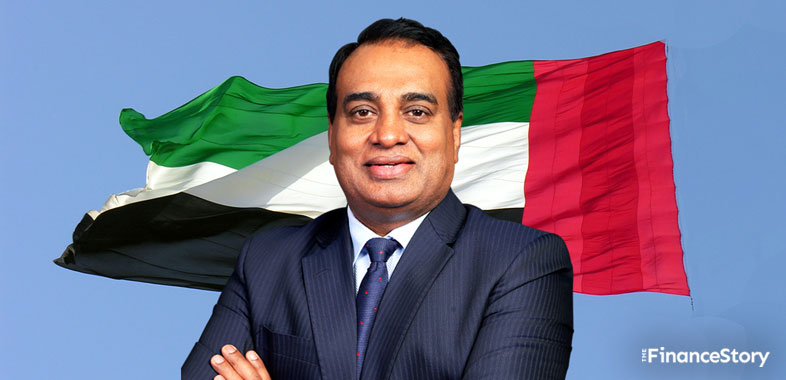- As of mid-2020, there were over 350,000 SMEs in the UAE employing 86% of the labor force.
- For our Career Overseas Series, we interviewed CA James Mathew, Managing Partner at UHY James Chartered Accountants.
- He gives us insights into possible opportunities for Finance Professionals in the UAE.
30 years ago you moved to the UAE as a freshly qualified CA. How has your career evolved?
I arrived in the UAE as a qualified Chartered Accountant and began my career with a mid-tier accounting firm in 1992.
After five years of learning and advising clients on business strategies and internal control weaknesses, I shifted to Horwath Mak (now Crowe Mak).
I started at Crowe as a Partner and worked my way up to become the Senior Partner and CEO of the UAE and Oman businesses.
Just before Covid hit us, we established UHY James Chartered Accountants with the help of about 80 professionals, including 5 Partners. It is an independent member firm of UHY International.
Operating in 102 countries, UHY is one of the top 20 Accounting Networks in the world.
UHY James Chartered Accountants has grown into a team of 120 members and 6 Partners.
We provide services such as Audit, Corporate Finance, Tax, Technology, Strategy Transformation, Advisory, and Cybersecurity.
How has the UAE become a Global Business Hub?
In 2022 UAE’s population reached over 10 Million people, and astonishingly the number of total expats was around 8 Million. But why the surge in numbers?
UAE’s top-notch infrastructure, be it well-structured port facilities, or airline connectivity has been attracting entrepreneurs to set up their businesses in the country. Many companies want to explore this area as it is a gateway to the GCC and African regions.
Real Estate: UAE’s real estate market opened in 2001-2002, providing freehold rights for owning property as non-nationals. This industry is a key part of the country’s economic diversification effort and has grown phenomenally.
Tourism & Hospitality Industry: Over 15 Mn people from around the world visited the UAE in 2022. As one of the biggest tourist destinations, it is evident that UAE’s Tourism & Hospitality Industry is booming.
Tax Advantage: UAE’s favorable trade and tax regime has given rise to the growth of manufacturing, mining, wholesale and retail industries.
Freezone: A free zone company in the UAE is a company registered in a special economic zone that falls under a specific Emirate. UAE has about 45 Freezones, which cater to 60,000 companies. An expat business owner can have complete ownership of the company in the Freezone and won’t have to pay a 5% customs duty for the imported goods (this is not the case for companies in the Mainland).
Result of Brexit: After Brexit, more people are coming here for business.
Owing to all the aspects mentioned above, the UAE’s GDP rose to AED 1.84 trillion (US$501 billion) in 2022.
As of 2021, there were 450,000+ registered companies in the UAE. The country has 360,000 businesses registered for VAT and 160+ listed companies. And the astonishing part is that 80-85% of these companies are SMEs.
Corporate tax will become effective in UAE from June 2023. Do you see more opportunities for Finance and Accounting Professionals?
A 9% corporate tax will be levied on all individuals carrying on business activities in the UAE.
Although more clarity is expected, any CA who wants to set up a consultancy firm in UAE should gear up.
Compared to VAT, corporate tax has more nuances. You need transfer pricing experts and taxation experts which would require a lot more investment in the practice.
The Companies Law states that companies must have their accounts audited and submit them to The Ministry of Economy, UAE annually. This law has not gained full momentum as a practice yet.
However, companies registered with the Dubai Development Authority are required to mandatorily submit audit reports. It is expected that other free zones and regulatory authorities in the UAE will eventually comply and follow suit.
We have approximately 450+ audit firms in the UAE. If audits become compulsory for these companies you can imagine what opportunity it would present.
With corporate tax coming in, business owners would not want to get into complex situations. They would need a CA or CFO to look into it and ensure they comply with the laws.
Many professionals cannot find opportunities in the UAE despite having all the qualifications. What would be your advice to them?
It is true that sometimes you don’t get the desired outcome despite trying your best. All you need is patience.
Everyone should have a story that conveys their capabilities.
You have to understand that there are over 8000 CAs in the UAE, and all have studied the same material. But what sets you apart is what will get you the job.
This could be your tech skills, communication skills, or other areas through which you can impress your employer. You have to find out what you can improve on.
With advanced Artificial Intelligence coming in CAs cannot just be restricted to number crunching.
Hiring people can be expensive, so employers now prefer CAs with tech skills over someone who is only a CA.
If you believe that ‘I am good at accounting and this would get me the job.’ You are mistaken.
Learn skills that would add value to the organization, such as IFRS. It is an integral part of the corporate world in the UAE. Unless you are up to date with it, your chances of securing a job in the UAE will go down.
Last but not least, have an understanding of business. Modern CFOs are a partner to the business and a part of the decision-making process.
Looking to accelerate your career in finance or understand more about the UAE market? The Finance Story has introduced expert connect where you can speak to industry experts. Fill up this form to talk to an industry expert.







